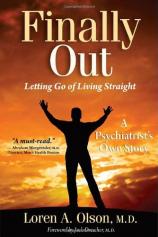Reading Group Guide
Discussion Questions
Finally Out: Letting Go of Living Straight, A Psychiatrist

1. Do you believe that it is possible for someone not to know they are gay until they are forty years old? What are some of the family/sociocultural factors that might cause that to happen? Do you believe that most men who come out in midlife don't really know they are gay?
2. Do you believe that men who are married and have sex with other men are all gay? How would you define them? What do you believe most women feel when they find out that their husband is gay?
3. What are the most common stereotypes of gay men? Of mature gay men? What leads to stereotypes? How do they harm a person's self esteem?
4. Several recent polls have found that 80 percent of people in the United States believe that men and women who are gay were born that way. What do the remaining 20 percent believe? Why do you think the remaining 20 percent resist so strongly the idea that homosexuality is innate?
5. What counsel would you offer someone who believed their friend, sibling or child was confused about their sexual orientation or perhaps even a closeted gay man and about to enter into a heterosexual marriage? Do you believe it would be ethical to share your concerns with anyone else including the future spouse?
6. We’ve all heard news scandals about politicians involved in same sex affairs who deny they’re gay. Many of them were at the forefront of anti-gay politics. Can you explain this phenomenon? What is the difference between gay behavior and gay identity?
7. Much of the anti-gay sentiment is based within the religious community. How is it possible for fundamentalist churches and progressive churches to have such strong disagreement on the subject? What would you tell a gay man or woman who felt that they had no alternative but to choose between their sexual orientation and their religious faith?
8. Finally Out tells the story of a gay man who was murdered because he was gay. Recent discussions have focused our attention on bullying in the schools and suicides of gay adolescents. What are the mental health implications for a mature man or woman who feels they must live a heterosexual life?
9. Mature men and women have the capacity to think for themselves and decide whether or not to commit to the values of their parents. What are some of the values of your parents --- sexual values or non-sexual ones --- that you have decided you do not agree with? What effect does challenging those beliefs have on the way you feel about yourself.
10. How is it possible that a lower tolerance or acceptance of homosexuality might contribute to higher rates of transmission of HIV/AIDS and other sexually transmitted diseases?
11. What are the challenges of aging, and how are they same or different for gay men and women?
12. How would you advise fathers to come out to their children and/or grandchildren who are under the age of twelve? What should his children/grandchildren be told about the nature of his relationship if he lives with a partner?
13. It is said that in decision-making we over-estimate the potential losses and underestimate the potential gains? What are the actual losses and gains a gay man or woman might experience in coming out? What are the areas about which the gay person is most likely to misjudge about those gains and losses?
Finally Out: Letting Go of Living Straight, A Psychiatrist
- Publication Date: April 8, 2011
- Paperback: 280 pages
- Publisher: inGroup Press
- ISBN-10: 1935725033
- ISBN-13: 9781935725039







